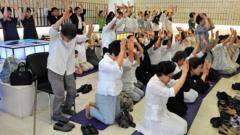The ruling stems from a case where the shooter confessed to harboring grievances against Abe related to the latter's ties with the church, claiming its actions had led to his family's financial ruin. Although the court has ruled to strip the church of its tax-exempt status and necessitate asset liquidation, it still retains the ability to operate within the country. This decision follows a series of testimonies from nearly 200 former followers who alleged manipulation and coercion, seeking a cumulative compensation of 5.7 billion yen (approximately $38.5 million).
The Unification Church, founded by Sun Myung Moon, has long been a contentious presence in Japan, with prior allegations pertaining to its practices surrounding forced donations and its teachings promoting large-scale wedding ceremonies for spiritual salvation. Revelations of close interactions between the church and numerous lawmakers from the ruling Liberal Democratic Party (LDP) have further compounded the controversy, triggering the resignation of four ministers and leading to the discovery that 179 out of 379 of its lawmakers had engaged with the organization.
The court's decision marks a significant moment in the ongoing discourse around the intersection of religion and politics in Japan, underlining the complexities of the church's influence and its ramifications in political landscapes. The Unification Church plans to appeal the court's ruling, while legal battles over its practices continue to unfold in public forums.
The implications of this ruling will likely reverberate throughout Japanese society as the investigation continues, highlighting the historical relationship between politicians and controversial religious organizations.
The Unification Church, founded by Sun Myung Moon, has long been a contentious presence in Japan, with prior allegations pertaining to its practices surrounding forced donations and its teachings promoting large-scale wedding ceremonies for spiritual salvation. Revelations of close interactions between the church and numerous lawmakers from the ruling Liberal Democratic Party (LDP) have further compounded the controversy, triggering the resignation of four ministers and leading to the discovery that 179 out of 379 of its lawmakers had engaged with the organization.
The court's decision marks a significant moment in the ongoing discourse around the intersection of religion and politics in Japan, underlining the complexities of the church's influence and its ramifications in political landscapes. The Unification Church plans to appeal the court's ruling, while legal battles over its practices continue to unfold in public forums.
The implications of this ruling will likely reverberate throughout Japanese society as the investigation continues, highlighting the historical relationship between politicians and controversial religious organizations.



















